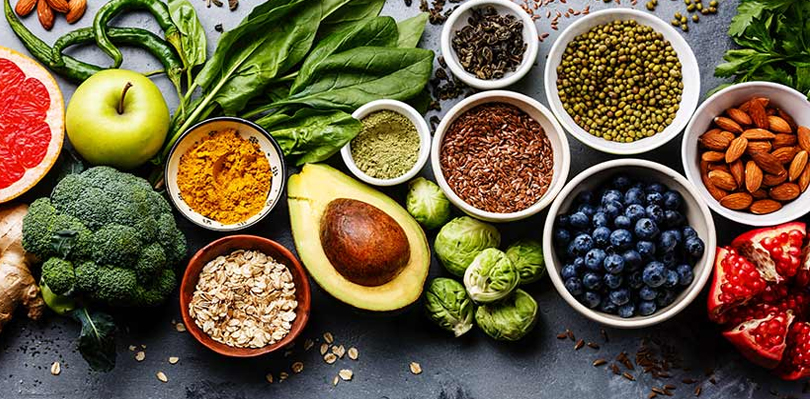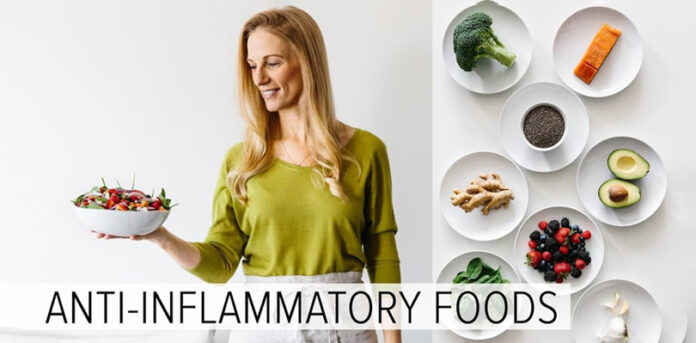Are you tired of dealing with constant gut discomfort and inflammation? It’s time to take control of your digestive health with the power of food. In our fast-paced lives, maintaining a balanced gut can often be overlooked, but it’s essential for overall well-being. Fortunately, the solution might be simpler than you think. In this insightful blog post, we’ll introduce you to the “8 Ultimate Anti-Inflammatory Foods Good for Your Guts.”
These delicious and nutritious ingredients not only tantalize your taste buds but also work wonders in soothing inflammation, promoting better digestion, and boosting your immune system. Say goodbye to bloating, discomfort, and digestive woes as we unveil the secret to a happier, healthier gut through the incredible world of anti-inflammatory foods. Your gut will thank you, and your body will too!
Anti-Inflammatory Foods Good For Your Guts

Turmeric
This golden spice contains curcumin, a potent anti-inflammatory compound. To reap its benefits, add a teaspoon of turmeric to your morning smoothie or sprinkle it over roasted vegetables. For better absorption, combine it with a pinch of black pepper.
Ginger
Ginger’s anti-inflammatory properties are well-known. Enjoy it in a soothing cup of ginger tea, or incorporate it into stir-fries and soups for a zesty kick. Fresh ginger is preferable for maximum potency.
Berries
Blueberries, strawberries, and raspberries are rich in antioxidants and fiber. These berries reduce inflammation and promote gut health. Add them to your yogurt, or oatmeal, or enjoy them as a healthy snack.
Fatty Fish
Salmon, mackerel, and sardines are packed with omega-3 fatty acids that combat inflammation. Grill or bake them with herbs and a squeeze of lemon for a flavorful, anti-inflammatory meal.
Leafy Greens
Spinach, kale, and Swiss chard are loaded with vitamins, minerals, and antioxidants. Incorporate them into your salads, and smoothies, or sauté with garlic and olive oil for a nutritious side dish.
Nuts And Seeds
Almonds, walnuts, flaxseeds, and chia seeds are high in healthy fats and fiber. Sprinkle them on top of your cereal, or yogurt, or blend them into a nutritious smoothie.
Broccoli
This cruciferous vegetable contains sulforaphane, a compound with anti-inflammatory properties. Steam, roast, or stir-fry broccoli to retain its nutritional value.
Probiotic Foods
Yogurt, kefir, sauerkraut, and kimchi are rich in probiotics, which support a healthy gut microbiome. Enjoy a serving of these foods daily for improved gut health.
Remember, consistency is key. Incorporate these anti-inflammatory foods into your daily diet, and over time, you’ll likely notice improved gut health and reduced inflammation. Pair them with an overall balanced diet and a healthy lifestyle to maximize their benefits for your digestive system.
Benefits Of Anti-Inflammatory Foods
Anti-inflammatory foods offer a wide range of benefits beyond just soothing inflammation. Here are some advantages of incorporating them into your diet:
Turmeric
This golden spice contains curcumin, a potent anti-inflammatory compound. To reap its benefits, add a teaspoon of turmeric to your morning smoothie or sprinkle it over roasted vegetables. For better absorption, combine it with a pinch of black pepper.
Ginger
Ginger’s anti-inflammatory properties are well-known. Enjoy it in a soothing cup of ginger tea, or incorporate it into stir-fries and soups for a zesty kick. Fresh ginger is preferable for maximum potency.
Berries
Blueberries, strawberries, and raspberries are rich in antioxidants and fiber. These berries reduce inflammation and promote gut health. Add them to your yogurt, or oatmeal, or enjoy them as a healthy snack.
Fatty Fish
Salmon, mackerel, and sardines are packed with omega-3 fatty acids that combat inflammation. Grill or bake them with herbs and a squeeze of lemon for a flavorful, anti-inflammatory meal.
Leafy Greens
Spinach, kale, and Swiss chard are loaded with vitamins, minerals, and antioxidants. Incorporate them into your salads, and smoothies, or sauté with garlic and olive oil for a nutritious side dish.
Nuts And Seeds
Almonds, walnuts, flaxseeds, and chia seeds are high in healthy fats and fiber. Sprinkle them on top of your cereal, or yogurt, or blend them into a nutritious smoothie.
Broccoli
This cruciferous vegetable contains sulforaphane, a compound with anti-inflammatory properties. Steam, roast, or stir-fry broccoli to retain its nutritional value.
Probiotic Foods
Yogurt, kefir, sauerkraut, and kimchi are rich in probiotics, which support a healthy gut microbiome. Enjoy a serving of these foods daily for improved gut health.
Remember, consistency is key. Incorporate these anti-inflammatory foods into your daily diet, and over time, you’ll likely notice improved gut health and reduced inflammation. Pair them with an overall balanced diet and a healthy lifestyle to maximize their benefits for your digestive system.
What Doctors Say about Anti-Inflammatory Foods
Doctors emphasize the significant impact of anti-inflammatory foods on gut health. These foods, rich in antioxidants, fiber, and healthy fats, can reduce inflammation in the digestive system. They often recommend them to patients with gastrointestinal issues like irritable bowel syndrome (IBS), Crohn’s disease, or ulcerative colitis.
Anti-inflammatory foods support a balanced gut microbiome, aiding in digestion and nutrient absorption. They also play a vital role in preventing chronic diseases linked to gut inflammation, such as colon cancer. While medical treatment remains essential for specific conditions, incorporating these foods into your diet can complement therapeutic interventions and contribute to long-term digestive wellness.
Tips And Ideas For Anti-Inflammatory Foods
Start Your Day With A Turmeric Latte
Replace your regular coffee with a soothing turmeric latte. Turmeric’s active compound, curcumin, has potent anti-inflammatory properties. Mix a teaspoon of turmeric powder with warm milk (or a dairy-free alternative) and a dash of black pepper to enhance absorption. Add a touch of honey or cinnamon for flavor.
Create Colorful Salads
Build vibrant salads using a variety of anti-inflammatory ingredients. Include leafy greens like spinach and kale, add colorful bell peppers, and cherry tomatoes, and top with walnuts or almonds for added crunch and healthy fats. Drizzle with olive oil and balsamic vinegar for a tasty dressing.
Whip Up A Berry Smoothie
Berries like blueberries and strawberries are rich in antioxidants that combat inflammation. Blend them into a refreshing smoothie with Greek yogurt or almond milk. For an extra anti-inflammatory boost, toss in a handful of spinach or kale.
Prepare A Mediterranean-style Meal
The Mediterranean diet is renowned for its anti-inflammatory benefits. Create a Mediterranean-inspired dish by grilling or baking salmon with olive oil, lemon, and a sprinkle of oregano. Serve it alongside a quinoa salad with cucumbers, olives, and feta cheese for a well-rounded anti-inflammatory meal.
Enjoy A Gut-Friendly Snack
Opt for gut-friendly snacks like yogurt with probiotics or kefir. These dairy products support a healthy gut microbiome. Alternatively, snack on a handful of mixed nuts and seeds for a satisfying, anti-inflammatory crunch.
Remember to incorporate these ideas into a balanced diet for maximum benefit. A variety of anti-inflammatory foods will provide your body with a broad spectrum of nutrients and antioxidants to combat inflammation and promote overall health.
FAQs
Can I solely rely on these anti-inflammatory foods for gut health?
While incorporating anti-inflammatory foods is essential for gut health, it’s not the only factor to consider. A well-rounded diet that includes a variety of nutrients is crucial. Additionally, factors like stress management, hydration, and physical activity play significant roles in digestive wellness. Consult with a healthcare professional or a registered dietitian to create a personalized plan that considers your specific gut health needs.
Are there any potential side effects or allergies associated with these foods?
Some individuals may be allergic or intolerant to certain anti-inflammatory foods. For example, those with tree nut allergies should avoid nuts like almonds and walnuts. Additionally, excessive consumption of certain foods, like fatty fish, may lead to mercury exposure. It’s vital to be aware of any allergies or sensitivities you have and consult with a healthcare provider if you have concerns about your diet.
How long does it take to see improvements in gut health with these foods?
The timeline for experiencing improvements in gut health can vary from person to person. Some individuals may notice positive changes within a few weeks, while others may take several months. Consistency is key. Incorporating anti-inflammatory foods into your diet over the long term can gradually improve gut health and reduce inflammation. However, for specific gut conditions, such as irritable bowel syndrome (IBS) or inflammatory bowel disease (IBD), it’s essential to work closely with a healthcare provider to monitor progress and adjust your diet as needed.

